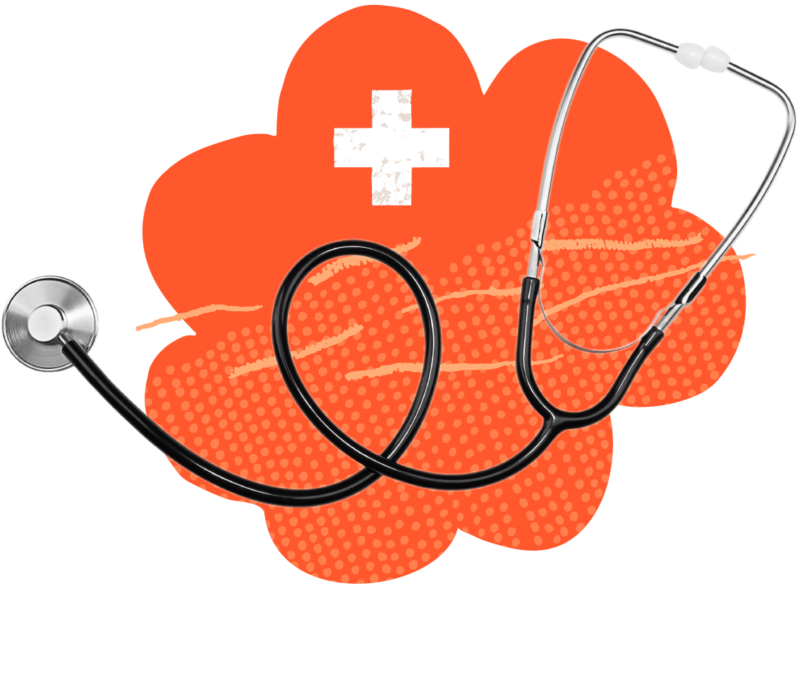For Healthcare Professionals
Learn to talk about weight & food without harm.
Earn 2.0 CME credits and build the skills to talk with kids and families about food and body in a supportive, stigma-free way.
What to Say Healthcare is a self-paced online course designed for healthcare professionals who want to help transform pediatric care by preventing disordered eating and promoting lifelong well-being.

Developed in collaboration with leading healthcare experts, this CME course equips providers with research-backed communication strategies to prevent eating disorders and promote positive health outcomes in pediatric settings.
This course is available to earn 2 CME Credits. Please see the "Accreditation and Registration Details" section below for more information.
Key Learnings
Recognize and Prevent
Identify eating disorders before they start, with evidence-based prevention strategies.
Navigate Critical Conversations
Talk with kids and parents about food and health--without causing harm.
Address Weight Stigma
Explore the impact of weight stigma in healthcare settings and learn strategies to mitigate its effect.

Enroll Today, Empower Tomorrow
Every course sign-up helps provide financial assistance for recovery.
- General Course: $79
- New Physician: $75 (Use coupon code: NEWDOC75)
- Student or Resident: $60 (Use coupon code: STUDENT60)
- If payment isn’t feasible, Use coupon code: MISSION-SUPPORT-DISCOUNT
Activity Details
Release Date: 1/8/2024 (AAFP); 3/14/2025 (ACCME)
Expiration Date: 12/1/2026 (AAFP); 3/14/2027 (ACCME)
Medium: Internet (AAFP); Internet/Enduring Material, Video/Audio (ACCME)
Completion Time
2 hours
Specialty
Pediatrics, Family Practice
Topic(s)
Pediatrics, Eating disorders, weight stigma
Activity Outline
Module 1: Why & Guiding Philosophy
An introduction to the foundational concepts of What to Say Healthcare, delving into the evidence that supports its significance and effectiveness. Following, healthcare professionals will engage with comprehensive insights on the widespread occurrence of eating disorders and disordered eating patterns, understand the various risk elements with these conditions, and discover the critical role they can assume in fostering a healthy body image and constructive relationship with food among children.
- 20-minute lecture divided into three parts
- A video summary sheet
- A quiz
- A list of related resources and research
- An email template for providers to share WTS HC with colleagues and clinics
Module 2: Addressing Provider Concerns
Module 2 aims to equip providers with the necessary skills to discuss food and weight-related issues concerning pediatric patients in a manner that avoids stigma and promotes a supportive and understanding healthcare environment. Providers will learn best practices for discussing such concerns with patients and their parents.
- A 29-minute panel discussion
- A video summary sheet
- A quiz
- A list of related resources and research
- A Q&A reference sheet
- A list of example dot/smart phrases providers may use for such conversations with patients
Module 3: Addressing Parent Concerns
Module 3 is designed to guide providers in effectively addressing concerns related to food and weight that parents may have about their children, ensuring these sensitive topics are handled with care. Providers will be introduced to best practices for effectively addressing and managing concerns that parents may bring to them about their children’s eating habits or weight, fostering a constructive and sensitive dialogue.
- A 23-minute panel discussion divided into four parts
- A video summary sheet
- A quiz
- A list of related resources and research
- A Q&A quick reference sheet
A list of example dot/smart phrases providers may use for such conversations with patients.
Module 4: Weight Stigma
This module addresses weight stigma, providing insights into its manifestation in healthcare settings and examining its detrimental effects on patient health and treatment outcomes.
- A 37-minute interview-style discussion divided into two parts
- A video summary sheet
- A quiz
- A list of related resources and research
Accreditation & Registration Details
American Academy of Family Physicians: The AAFP has reviewed the What to Say Healthcare and deemed it acceptable for up to 2 Enduring Materials by American Academy of Family Physican Prescribed credits. Term of Approval is from 12/1/2025 to 12/01/2026. Physicians should claim only the credit commensurate with the extent of their participation in the activity.
AMA PRA Category 1 Credits™: This activity has been planned and implemented in accordance with the accreditation requirements and policies of the Accreditation Council for Continuing Medical Education (ACCME) through the joint providership of Continuing Education Company, Inc. and WithAll. Continuing Education Company, Inc. is accredited by the ACCME to provide continuing medical education for physicians.
Continuing Education Company designates this enduring material for a maximum of 2 AMA PRA Category 1 Credits™. Physicians should claim only the credit commensurate with the extent of their participation in the activity.
Release Date: 3/14/2025
Expiration Date: 3/14/2027
Medium: Internet/Enduring Material, Video/Audio
We suggest a donation of $79 for access to the course, but it is available for free with the discount code MISSION-SUPPORT-DISCOUNT if this amount is a barrier. WithAll is a fully donor-funded nonprofit working to prevent eating disorders and support eating disorder recovery. Your contribution helps us maintain this course and provide other educational resources to adult role-models to kids.
Presenters
Katie Loth, PhD, MPH, RD, Assistant Professor, Department of Family Medicine and Community Health, University of Minnesota
Laura Hooper, PhD, MS, RD, Assistant Professor of Pediatrics in the Division of Adolescent Medicine and the Division of Children’s Health Services Research | School of Medicine, Indiana University
Lesley Williams, M.D., Family Physician, Mayo Clinic, Arizona
Lisa Radzak, Executive Director, WithAll
Miss Shannan Paul, Comedian, Speaker, Host & Emcee
Instructions for Participation and Credit
To receive a certificate of participation, participants must:
- Follow instructions to register or log in. We recommend taking the course on a computer instead of a mobile device.
- View the online activity in its entirety, including completing each module comprehension quiz.
- Complete and submit the online post-assessment and evaluation.
A certificate of participation will be emailed to the email address provided within 72 hours following your successful completion of all 12 sections, including the post-assessment and evaluation.
For questions regarding CME credit, contact WithAll at hello@withall.org.
What Healthcare Providers Are Saying

What to Say
Have you watched our What to Say video? We recommend all adult role models start here.
Partners
Funding for this program wouldn’t be possible without our amazing sponsors.

Support What to Say Healthcare
Empowering providers to build kids up.
Your gift helps bring evidence-based training to providers so they can have supportive, stigma-free conversations with kids and families. With your support, we can shift medical culture, reduce stigma, and prevent eating disorders before they start.
100% funded by individuals, families, and businesses.




